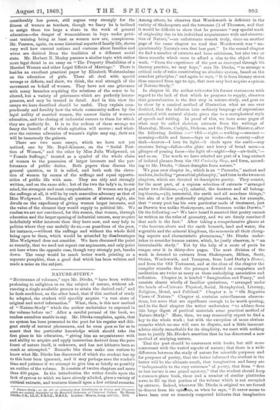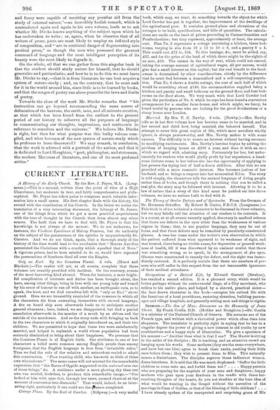NATURE-STUDY."
"HUNDREDS of volumes," says Mr. Dircks, " have been written professing to enlighten us on the subject of nature, without ad- vancing a single available process to attain the desired end ;" and he feels confident, on the other hand, that if this method of study be adopted, the student will speedily acquire "a vast store of original and novel information." What, then, is this new method of " Nature-Study " which the author undertakes to expound in the volume before us? After a careful perusal of the book, we confess ourselves unable to say. Mr. Dircks complains, again, that no system has been presented to the poet for his regular and dili- gent study of natural phenomena, and he even goes so far as to assert that the particular knowledge which should take the first place in his education, " giving him an acquaintance with and ability to acquire and apply instruction derived from the pure fount of nature itself, is unknown, and has not hitherto been so much as attempted." Remarks like these make one curious to know what Mr. Dircks has discovered of which the student has up to this hour been ignorant, and it may perhaps save the reader's time and patience if we attempt to give him as briefly as possibly an outline of the volume. It consists of twelve chapters and more than 400 pages. In the introduction the writer dwells upon the lack of system to which we have already alluded, gives a variety of ciritical extracts, and ventures himself upon a few critical remarks.
* Nature-Study ; or, the Art of attaining those Excellencies in Poetry and Eloquence which are mainly dependent on the Manifold Influences of Universal Nature. By Henry Bunke, 0.B., LLD., F.R.S.E., DLB.S.L. London : Holton, Long, and Co.. 1889.
Among others, he observes that Wordsworth is deficient in the variety of Shakespeare and the terseness (!) of Thomson, and that it would be difficult to show that he possesses "any special mark of originality due to his individual acquaintance with and observa- tion of Nature,"—an unfortunate remark truly, since on another page of the same chapter we read that Wordsworth was " un- questionably Nature's own first best poet." In the second chapter we find a number of extracts and loose criticisms, but also two or three remarks which seem to afford a clue to the object of the work. " From the experience of the poet as conveyed through his literary practice, we may hope," says Mr. Dircks, " to arrange a critical code of rules constituting an absolute system, based on the- soundest principles ;" and again he says, " It is from literary stores thus amassed from age to age, that man may best acquire a system of Nature-Study."
In chapter iii. the author reiterates his former statements with. regard to the lack of that which he proposes to supply, observes. that generalization is the first step in nature-study, and goes on to show by a comical method of illustration what no one ever doubted, that the infusion into ordinary language of expressions. associated with natural objects gives rise to a metaphorical style- of speech and writing. In proof of this, we have some pages of what may be called skeleton extracts from the writings of Macaulay, Moore, Carlyle, Dickens, and the Prime Minister, after- the following fashion :—" Old — night — walking—summer — morning—fields and lanes—days or weeks—the country—after dark—heaven—I love its light—it sheds upon the earth—any creature living—fallen—the glare and hurry of broad noon—a. glimpse of passing faces—the light of —night—day—air-built,"— and so on. The words we have selected are part of a long extract of isolated phrases from the Old Curiosity Shop, and form, accord- ing to Mr. Dircks, "direct draughts from nature."
We pass over chapter iv., which is on " Proverbs," ancient and' modern, including "proverbial philosophy," and turn to the two next- chapters, which are devoted to descriptive poetry. They consist, for the most part, of a copious selection of extracts " arranged under two divisions,—(l), celestial, the heavens and all belong- ing thereto,—(2), terrestrial, the earth and all mundane thinge,'r but also of a few profoundly original remarks, as, for example,. that " every poet has his own particular mode of treatment, just as Darwin was unlike Shakespeare, and Thomson unlike Darwin." Or the following :—" We have heard it asserted that poetry cannot be written on the rules of geometry, and we are firmly convince& that such is the fact." After taking a comprehensive glance at "the heavens above and the earth beneath, land and water, the vegetable and the mineral kingdoms, the seasons in all their chang- ing aspects and characteristic phenomena," Mr. Dircks under-. takes to consider human nature, which, he justly observes, is " au interminable study." Yet by the help of a score of poets he ranges over it in thirty-five pages. The next division of the- work is devoted to extracts from Shakespeare, Milton, Scott,. Ossian, Wordsworth, and Tennyson, from Lord Derby's Homer,. and from the Old Testament, and at the close of the chapter the compiler remarks that the passages devoted to comparison and meditation are twice as many as those embodying association and reflection. Chapter.ix. is headed " Imagination and Fancy," and consists almost wholly of familiar quotations, " arranged under the heads of—Universe Physical, Social, Metaphysical, Literary,. Religious, Moral, and Political." Chapter x. is " Oh Negative- Views of Nature." Chapter xi. contains miscellaneous observa- tions, but none that are significant enough to be worth quoting, and in the final chapter the writer undertakes "to adduce from this large digest of poetical materials some practical method of Nature-Study." Here, then, we may reasonably expect to find a key to the whole work ; but with the exception of some obvious remarks which no one will care to dispute, and a little innocent advice chiefly remarkable for its simplicity, we meet with nothing- here to justify Mr. Dircks's assertion that he has discovered a new' method of studying nature.
That the poet should be conversant with books, but still more conversant with the varied aspects of nature ; that there is a wide- difference between the study of nature for scientific purposes and for purposes of poetry, that the better informed the student is the better will be the ultimate result, that imagination and fancy are " indispensable to the very existence" of poetry, that from " first to last nature is one grand mystery," that the student should keep• a common-place book, these and a number of similar platitudes. serve to fill up that portion of the volume which is not occupied by extracts. Indeed, wherever Mr. Dircks is original we are forced to dissent from his opin%ns, as when be says, " It never seems to have been ever so remotely suspected hitherto that imagination
and fancy were capable of receiving any peculiar aid from the study of external nature,"—an incredibly foolish remark, which is contradicted again and again in his own volume, leads us to ask whether Mr. Dircks knows anything of the subject upon which he has undertaken to write ; or, again, when he observes that of all writers of prose, poets are most likely to employ an inflated style of composition, and are in continual danger of degenerating into poetical prose," as though the men who possessed the greatest command of language and the most intelligent perception of its beauty were the most likely to degrade it.
On the whole, all that we can gather from this singular book is that the student should study nature for himself, that he should generalize and particularize, and how he is to do this we must leave Mr. Dircks to say,—that it is from literature he can best acquire a system of nature-study ; and, on the contrary, that he must seek for it in the world around him, since little is to be learned by books, and that the usages of poetry can alone prescribe the laws and limits of poetry.
Towards the close of the work Mr. Dircks remarks that " his instruction can go beyond recommending the same course of delineation of the heavens, the earth, man, and all animate creation, as that which has been found from the earliest to the present period of our history to subserve all the purposes of language in communicating our thoughts, impressions, and sentiments in reference to ourselves and the universe." We believe Mr. Dircks is right, but then for what purpose was this bulky volume com- piled, and what becomes of the new system of nature-study which he professes to have discovered ? We may remark, in conclusion, that the work is adorned with a portrait of the author, and that it is dedicated to Lord Houghton, " poet, philosopher, and statesman, the modern Maecenas of literature, and one of its most profound critics."































 Previous page
Previous page